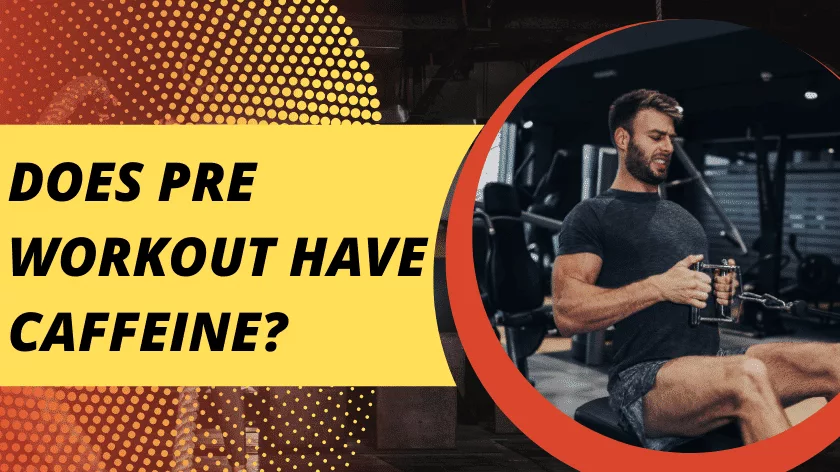The thing about pre-workout supplements is that they’re not all created equal. Some contain ingredients that can give you an energy boost, while others are focused more on helping you build muscle. But does pre workout have caffeine?
Well, it depends on the product.
While some pre-workouts don’t contain caffeine, otherwise known as ‘stim-free’ supplements, plenty of these products do. Caffeine is a popular ingredient in these products because it can help to improve energy levels, focus, and even endurance [1].
If you’re sensitive to caffeine or want to avoid it altogether, then it’s worth checking the label of any pre-workout supplement you’re considering taking.
However, if you don’t mind a little caffeine in your system, then a pre-workout with this ingredient can be a great way to help you power through your workout.
Continue reading to learn more about pre-workouts with caffeine, including why you should consider taking one and reasons some people might want to avoid them.
What Are the Benefits of a Pre-Workout Supplement with Caffeine?
1. Improved Energy Levels
Caffeine’s effects on the body are well-documented, and one of the most noticeable is an increase in energy levels. If you often feel tired during or after a workout, taking a pre-workout with caffeine could help you to power through and feel more energized.
Those who work out in the morning may also find that caffeine helps them to wake up and get going. Perfect for those days when you can’t seem to shake off the sleepiness!
2. Improved Focus
Do you struggle to focus during your workouts? Caffeine can also help with this. Taking a pre-workout supplement with caffeine can help improve your focus and concentration, making it easier to get through your reps and sets.
And as a bonus, this improved focus can also help you to perform better. If you’ve been struggling to see results from your workouts, then a pre-workout with caffeine could be just what you need to take your training to the next level.
3. Enhanced Endurance
Getting through an intense workout can be challenging, especially if you’re tired. But if you take a pre workout with caffeine, it can help to improve your endurance and allow you to push yourself harder for longer.
The reason for this is that caffeine can help to delay the onset of fatigue, meaning you can keep going for longer before your muscles reach a point of exhaustion. This is especially beneficial for those looking to improve their cardiovascular endurance or increase the amount of time they can lift weights.
4. Improved Performance
Pre-workouts containing caffeine are a staple for many athletes and gym-goers for a reason – they work! Caffeine has been shown to improve aerobic and anaerobic exercise performance, meaning you can run faster, cycle further, or lift heavier weights when you take it before working out.
If you’re all about those gains, a pre-workout with caffeine can help you achieve them by giving you that little extra edge during your workouts.
Pre Lab Pro – The World’s Smartest Pre-Workout

Pre Lab Pro is the perfect way to maximize your workout benefits and minimize side effects. This powerful stack of caffeine and boosters will help you power through your workouts while keeping you energized and focused. Don’t miss out on these incredible benefits – order Pre Lab Pro today!
How Does Caffeine Work and How Much Should You Take?
Ah, caffeine. The energizing elixir helps us power through early mornings, late nights, and everything in between. But how does this miracle drug actually work?
When you consume caffeine, it travels to your brain and binds to receptors that usually interact with a neurotransmitter called adenosine. This binding prevents adenosine from doing its job, which is to make you feel sleepy.
Caffeine also causes an increase in the production of other neurotransmitters like dopamine and norepinephrine, which helps to improve alertness and focus further.
As for how much caffeine you should take, it depends on the person. Some people are more sensitive to the effects of caffeine than others and may need to limit their intake.
However, most healthy adults can safely consume up to 400 milligrams of caffeine daily. Just don’t consume it all at once – spreading your intake throughout the day is best to avoid any adverse effects.
What Are The Potential Side Effects of Caffeine?
Anyone who’s ever had too much coffee knows caffeine can have some unpleasant side effects. The jitters, the energy crashes, the anxiousness – it’s enough to make you swear off caffeine for good.
But while it’s true that caffeine can be a bit of a double-edged sword, it’s also worth noting that most people can enjoy its benefits without experiencing any serious negative effects.
In moderation, caffeine can help to improve focus and concentration, and it can even provide a much-needed boost of energy when you’re feeling sluggish.
So if you’re looking to try a pre-workout supplement with caffeine, just be sure to start with a small dose and increase it gradually until you find the sweet spot.
And, of course, always listen to your body – if you start to feel any negative effects, simply back off on the caffeine and see how you feel.
3 Reasons to Avoid Pre Workout With Caffeine
It’s no secret that pre-workout supplements are designed to give you an extra edge in the gym. Most pre-workouts contain a variety of ingredients that can help to improve performance, but many of them also include caffeine.
And while caffeine does have its benefits, there are also some good reasons to avoid pre-workout supplements that contain this stimulant. Here are three of them:
1. You’re Sensitive to Caffeine
If you’re sensitive to caffeine, taking a pre-workout with this stimulant can cause some unpleasant side effects. These can include jitters, anxiety, and energy crashes – none of which are ideal before a workout.
2. You’re Trying to Cut Back on Caffeine
If you’re trying to reduce your caffeine intake, taking a pre-workout supplement is not the way to do it. Most pre-workouts contain a pretty hefty dose of caffeine, so you’ll often end up consuming more than you intended especially if you’re drinking caffeinated beverages like coffee throughout the day as well.
3. You’re Working Out Late at Night
Working out late at night can already be challenging enough, so you don’t need the added stimulant effect of caffeine. Taking a pre-workout with caffeine can make it even harder to wind down and get to sleep once your workout is over.
There are plenty of great options out there that don’t rely on caffeine to give you a boost. So if you’re looking for a pre-workout supplement, check the label and ensure it doesn’t contain this stimulant.
Does Pre Workout Have Caffeine? – The Bottom Line
So does pre workout have caffeine? The answer is yes; some supplements do. But considering the amount of caffeine varies widely from product to product, it’s best to check the label before you buy.
Pre-workouts containing over 200mg of caffeine per serving are generally a no-go for those sensitive to its effects, while lower doses may be just right. Either way, pre workouts with caffeine can certainly help take your workouts to a whole new level!





Leave a Reply